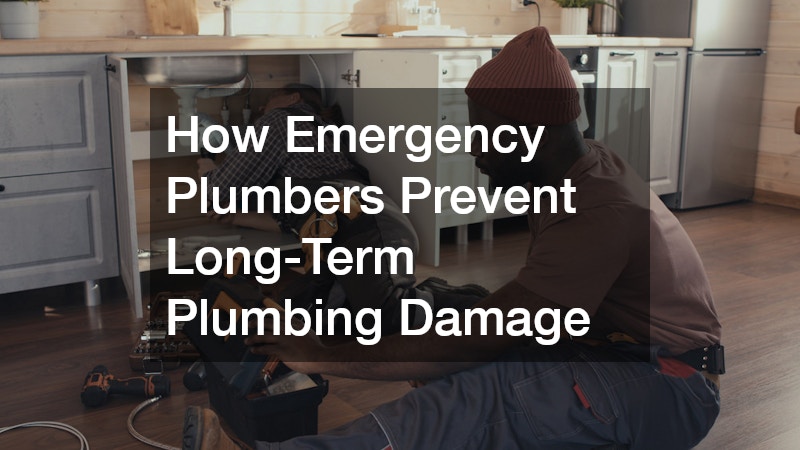
The importance of addressing plumbing issues promptly cannot be overstated. When minor leaks or clogs turn into major disasters, the damage can be extensive and costly. Emergency plumbers play a crucial role in mitigating these risks and preventing long-term damage. They provide immediate solutions that help to minimize disruption and safeguard homes.
Video Source
Often, homeowners may underestimate the severity of a plumbing issue, believing they can fix it themselves or that it can wait. This delay in action can lead to catastrophic outcomes if a plumbing emergency arises. Professional emergency plumbers are trained to handle various situations efficiently, ensuring that from the moment they arrive, the risk to your home is reduced significantly.
In this article, we will explore the common plumbing emergencies faced by homeowners, how emergency plumbers assess and address these issues, and the preventative measures they recommend. Understanding these concepts will empower you to take timely action and appreciate the value of having access to professional plumbing services.
Common plumbing emergencies often include burst pipes, severe leaks, and overflowing toilets. Each of these situations can lead to widespread water damage, mold growth, and structural issues if not dealt with immediately. When a pipe bursts, water can spray everywhere, causing immediate damage to floors and walls and creating unsafe conditions.
Severe leaks may start as minor drips but can quickly escalate, leading to significant property damage over time. This slow deterioration often goes unnoticed until it’s too late, creating an environment ripe for mold and other hazardous developments. Repairing leaks quickly is crucial for maintaining the integrity of your home.
Emergency plumbers utilize a variety of techniques and tools to assess plumbing damage accurately. Initially, they will investigate the source of the problem, utilizing advanced diagnostic equipment like video cameras to inspect pipes and locate leaks hidden behind walls or under floors. This high-tech approach allows them to pinpoint issues that traditional methods might overlook.
In addition to visual inspections, emergency plumbers may use pressure gauges and moisture meters to evaluate the extent of the damage. By determining how much pressure is behind a leak or how saturated the surrounding materials have become, they can decide on the most effective remediation strategy. Quick and thorough assessments are key to preventing prolonged exposure to water damage.
Furthermore, emergency plumbers are trained to consider the overall plumbing system during assessments. This comprehensive view allows them to identify potential weak points that could lead to future emergencies. By addressing current issues while also anticipating future problems, they help homeowners maintain a robust plumbing infrastructure.
Preventative measures are essential for avoiding plumbing emergencies. One of the most common recommendations made by emergency plumbers is regular maintenance checks on the entire plumbing system. Simple inspections can identify early signs of wear and tear, ensuring that potential issues are resolved before they escalate.
Homeowners should also be encouraged to install water alarms and leak detectors. These devices alert homeowners to issues before they become serious disasters, allowing for timely interventions. Implementing these systems can save significant costs associated with damage from leaks and floods.
Additionally, emergency plumbers often recommend insulating pipes in areas prone to freezing temperatures. This simple measure can prevent pipes from bursting during cold snaps. Keeping an eye on your plumbing system and implementing these preventative strategies can save homeowners from long-term plumbing damage and costly repairs in the future.
In the event of a plumbing emergency, homeowners must act quickly to mitigate damage. The first step is to turn off the water supply to prevent further flooding. Knowing where the main shut-off valve is located can make this process quicker and more efficient, minimizing potential damage to the property.
Next, it’s essential to assess the situation safely. If it is safe to do so, take immediate steps to contain the problem. For example, using buckets to catch water from leaks can prevent floor damage. However, if the emergency involves gas lines or electrical hazards, evacuating the premises is the safest course of action.
Finally, homeowners should contact emergency plumbing services as soon as possible. The sooner professionals arrive, the less likely extensive damage will occur. These experts will handle the situation with proper tools and knowledge, providing solutions that prevent long-term plumbing damage and restore function to the system.
Plumbing emergencies require immediate attention to prevent long-term damage. Understanding the types of emergencies, how emergency plumbers assess and rectify these issues, and implementing preventative measures can empower homeowners to manage plumbing problems effectively. Quick responses and professional assistance are invaluable in maintaining the integrity of plumbing systems.
